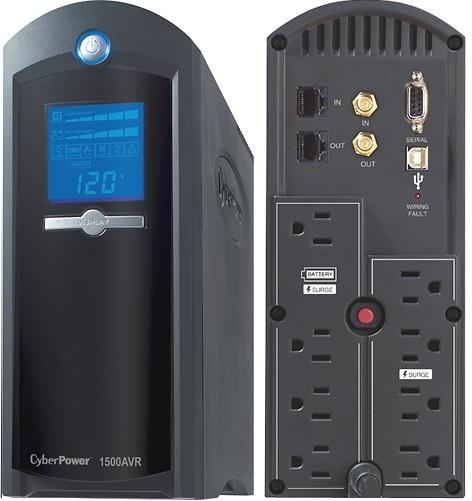
Pixels & Bits: Backup power keeps the game flowing…
For as long as I can remember, we have been taught/trained/brainwashed by salespeople and tech junkies alike to “protect our gear.” Usually, this means taking the time to add a basic six-bar plug with surge suppression to your computer, TV and other entertainment devices. I fell squarely under that thought process until an incident in several years ago caused me to change my mind and invest in a battery backup UPS to protect my gaming system and home theater gear. The incident in a nutshell was a power outage in my neighborhood (due to ongoing construction) that resulted in my Xbox 360 getting the RRoD, the DLP bulb on my projection TV blowing and the HDD on my cable box DVR going bad, all within 48 hours of the sudden outage. All of the damage to my gear was symptomatic of a sudden loss of power or power surge, so it was at that point that I added a backup UPS with line conditioning to protect the equipment that was repaired and replaced. Knock on wood; I have not had an issue since.

Why a battery backup UPS instead of a surge suppressor?
I imagine that some of you are reading this and asking the question why should you invest an extra $100 or so above the cost of an average surge suppressor for your gaming gear? Well for starters, the power outage that took out my gear would have cost me well over $500 to replace/repair it out of my own pocket. So it was a no brainer to me that I should try to prevent this from happening again with a small investment that should provide at least five-years of peace of mind. However, here are a few reasons that make a strong argument why a battery backup UPS is worth the extra investment for not only your equipment, but your gaming experience:
Much like computers, today’s current generation consoles (sans the Wii) have hard drives in them that should be protected like a computer. The HDD platter (disc) is a delicate piece that could easily be damaged with any unexpected power outage or surge and could lead to loss of data. Having your console on a UPS backup will prevent the console from ever losing power and damaging your HDD while it is writing. The UPS will also have surge suppression, and possibly a breaker that can be tripped when a massive power surge is experienced. But the protection isn’t just related to your HDD, it also protects any electrical components, processors and circuits of the consoles, TVs, router and stereo equipment you have plugged into it. Although not everything needs the battery backup, you also utilize the other non-UPS plugs to help prevent damage caused by power surges (spike in voltage), brownouts (temporary reduction in voltage.)
Eliminating interference
Whenever you get interference coming through a power line, it can impact both your audio and video quality and performance. The most common type of interference is when you see squiggly lines on the TV when a vacuum cleaner or some other power hungry appliance is running in the general vicinity. It also can impact audio, with noticeable noises or “audible static” becoming noticeable. This “Line Noise” can easily be eliminated with a backup UPS that has EMI filtering, which should be included in any around the $150 range. If you remove any interference, your games videos and audio will be as good as your equipment is capable of delivering.
Keeping your game up and running
As any gamer can tell you, one of the most frustrating things that can happen while playing is an unexpected power outage or surge that knocks you offline. Not only can these kick you out of a multiplayer match when you are on a Herculean kill streak in say, CoD, but it can set you back a ways in a game like Skyrim depending on your last save point. These two reasons alone are worth the backup power in my opinion. So investing in a good UPS with plenty of watts should provide you with ample time to finish up your multiplayer session or save your game if the power goes out. But it also prevents those random dropped games if you happen to just get a brief power flick that may knock your modem or router offline even though the power to the console or TV stays on. In short, battery backup makes sure your aren’t “that guy” below in the multiplayer room that ends up costing his whole team.

Which one to get?
Now that I may have your curiosity peaked to the point you might be interested in adding a battery backup UPS to your system, the next question is which one to get? When it comes to choosing the right model of backup UPS, there are a certain things to take into consideration (price, brand etc…), but the most important is how many continuous watts can be drawn from the UPS at a time. To make sure your UPS purchase aligns with the wattage consumption of your core gaming components (console, TV, router and internet access point), you have to identify the total watts you gear is consuming during an average gaming session to make sure you don’t exceed the UPS power rating.
I found a study that CNET did in April 2010 on the approximate watt usage for components used in a typical gaming session. The review will provide us with a baseline for usage in order to estimate how many watts the UPS you purchase will need. The results of the study are below, with averages for TV types (you can get better estimates based on size and type of TV from the detail of CNET’s population study) and specific counts for the consoles and other common gaming and home theater components.
| TVs/Home Theater/Networking | Watts | Game Console | Watts |
| Avg Plasma | 301 | PS3 | 197 |
| Avg LCD | 111 | PS3 Slim | 96 |
| Avg LED | 101 | Xbox 360 Elite | 185 |
| DirecTV H20 DVR | 33 | Xbox 360 Pro | 187 |
| Wireless Router | 7 | Nintendo Wii | 19 |
| Internet Access Point | 7 |
Using these numbers, if you are playing your PS3/Xbox 360 on a LCD or LED TV size 32-55”, you will need approximately 500 watts just for the console and the TV. If you have a plasma model above 58”, you will need to add about 250 more watts to your total, getting to almost 750 watts. Factor in routers and your high-speed internet access point; you probably want at least 800 to 900 watts of backup power in order to provide enough juice until you can cleanly shut down your system during a power outage. This wattage total can be adjusted based on your TV size and type, but most gamers will be able to pick up a decent UPS backup in the $120 - $160 range that will give you 700-900 watts of along with the EMI/RFI filters and surge suppression.
The Wrap Up
Although adding a battery backup UPS to your gaming system will tack on about $100 more than a typical surge suppressor, the benefits it can provide far outweigh the cost. Besides protecting your equipment from physical damage, it also keeps the audio and video clean and prevents your games getting cut short due to an unexpected power interruption. Although a battery backup UPS doesn’t fit into the “normal” equipment or accessory for a gaming system, this kind of outside the box thinking can provide you with many years of great gaming without any interruptions.
About the Author:
Dan Keener has been on staff at GamingNexus since 2006 and specializes in Audio & Video gear as well as gaming accessories and has over 15 years of Home Theater consulting and sales experience. If you have a question or comment for Dan or about the article, please leave it in the comments.

About Author
Like many gamers in their 40's, I developed my love of gaming from my Commodore 64 after we wore out our Intellivision. I spent countless hours wandering around the streets of Skara Brae, as my life was immersed in The Bard's Tale series on the C-64, D&D Titles and any/all Epyx titles (California Summer and Winter Games) and sports titles. After taking the early 90's off from gaming (college years) minus the occasional Bill Walsh College Football on Sega, I was re-introduced to PC games in the mid 1990's with a couple of little games called DOOM II and Diablo. I went all-in with the last generation of consoles, getting an Xbox 360 on launch weekend as well as adding a PS3 and Wii in subsequent years. I now am into the current-generation (latest?) of consoles with the WiiU and Xbox One. Recently, I was able to get back into PC gaming and have enjoyed it very much, spending most of my time going solo or playing with my fellow GamingNexus staffers in controlled multiplayer action.
While my byline is on many reviews, articles and countless news stories, I have a passion for and spent the last several years at GamingNexus focusing on audio & video and accessories as they relate to gaming. Having over 20 years of Home Theater consulting and sales under my belt, it is quite enjoyable to spend some of my time viewing gaming through the A/V perspective. While I haven't yet made it to one of the major gaming conventions (PAX or E3), I have represented GamingNexus at the Consumer Electronics Show (CES) in Las Vegas in nine of the last ten years.
Personally, I have been a staff member at GamingNexus since 2006 and am in my third tour of duty after taking off the last year and a half.

